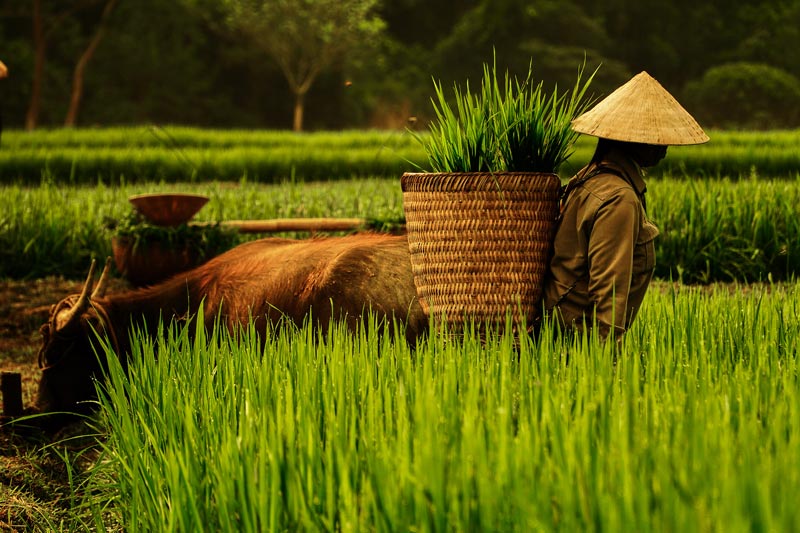
Water buffalo — known as the “living tractors of the East” — are members of the maintenance crew at 18-hole Laguna Golf Lăng Cô, located along the coast of central Vietnam. Photo courtesy of Laguna Golf Lăng Cô
One of Vietnam’s leading golf layouts, Laguna Golf Lăng Cô, a design by six-time major champion Nick Faldo, stays at the top of its game by employing a very special group of greenkeepers: a family of water buffalo.
The bovine trio act as bio-mowers and also protect the traditional Vietnamese landscape, helping manage rice paddies by eating excess weeds and crops that would otherwise require manpower and machinery to tackle.
Tu Phat, the father buffalo, leads the charge in tending the 4 hectares of rice fields located in the middle of the golf course. He works alongside Chi Chi, the mother, and their calf, Bao.
The rice paddies contour Laguna Golf Lăng Cô’s third and fourth holes, and they reappear on the back nine between the 13th green and 14th tee and also run alongside the 15th fairway.
Prime conditioning is key to the success of any golf course, and at Laguna Golf Lăng Cô — where golfers encounter tropical jungle, ocean sand dunes and rice paddies — the maintenance demands are shared among man, machinery and beast.
“We are pretty sure it’s a first in this part of the world to have animals performing such an important role on the golf course,” says Adam Calver, director of golf at Laguna Golf Lăng Cô. “In the early days of golf, when courses were mostly laid out on public land, it was not uncommon for sheep and cattle to roam freely across fairways and greens. Even today at some courses, notably the wilder links clubs in remote regions of Scotland and Ireland, livestock play their part in trimming turf and thinning out rough. But until now, courses in Asia have been less willing to let animals in on the greenkeeping act, so we’re pretty unique in that sense.”
Designer Nick Faldo and director of golf Adam Calver introduce Laguna Golf Lăng Cô:
Even on the course’s quietest days, the water buffalo are always out, wading through the rice paddies and performing their duties.
“We looked at various methods to increase the aesthetics of the rice paddies between the harvests, as continually mowing the fields to maintain vast rice terraces can consume a large amount of labor,” Calver says.
And the Laguna Golf Lăng Cô rice paddies aren’t just for show. Harvested twice a year, they yield up to 20 tons of rice that get donated to families and seniors in the area.
“We knew that having the holes weave through the rice fields would be a unique and memorable experience for golfers,” designer Nick Faldo says. “And there would be potential to give back to the community in a sustainable and regenerative fashion.
“All the best golf courses have character, and at Faldo Design, our philosophy has always been to work with the natural environment presented before us. Laguna Golf Lăng Cô is a special place, and right from the first moment we were on-site, we felt that if we could adapt to the surroundings, then we would be close to achieving something really special with this golf course.”